14th July 2021 Vienna, Austria
Diplomatic lesson 9: build your brand
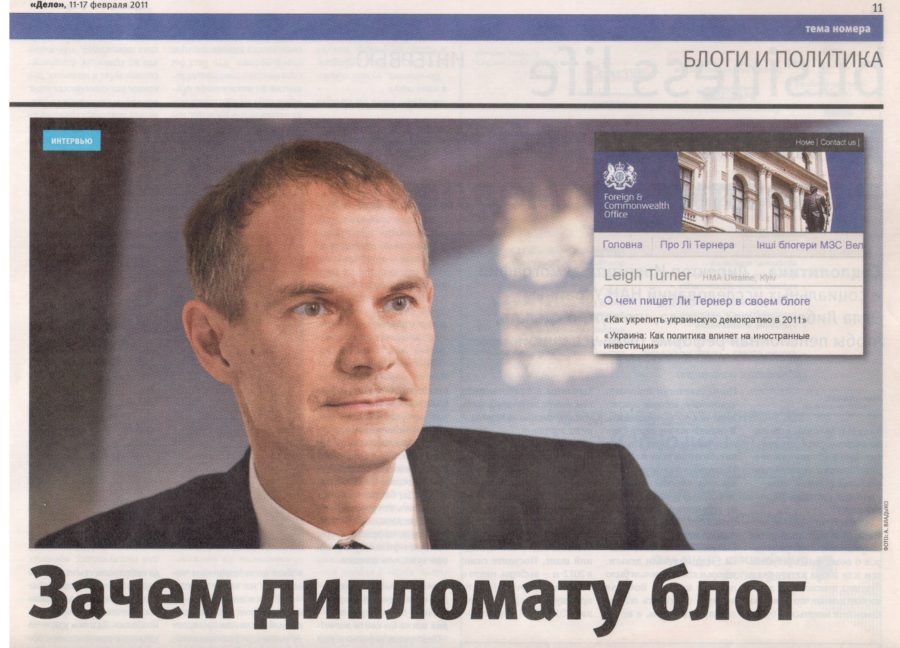
“When you’re an ambassador,” the wise ex-ambassador told me, fixing me with her steely gaze, “you’re miles from London. For visibility, you have to do something that people identify with you – build a brand, if you like.”
In January 2008 I attended a conference in Miami on my way to Anguilla (“British diplomat in Anguilla says no “secret plan” for overseas territories” headlines later read). The head of FCO personnel asked me to sit with her. “How would you feel about applying to be HMA (Her Majesty’s Ambassador in) Kyiv?” she asked. “It’s coming free unexpectedly in three months and we need a Russian or Ukrainian speaker.”
Embrace responsibility, I thought – and said yes.
Becoming an ambassador is one of the greatest privileges a diplomat can have. My letter of credence, signed by HM The Queen, told Ukrainian President Yushchenko that “We have made choice of Our Trusty and Well-beloved Leigh Turner, Esquire, to reside with You in the character of Our Ambassador Extraordinary and Plenipotentiary.”
When I did my farewell call on the Permanent Secretary (the highest-ranking civil servant in the Foreign Office), he asked if I was looking forward to it. “It’s a bit daunting,” I said, perhaps exhibiting excessive honesty. He frowned. “Enjoy it,” he said. This was good advice.
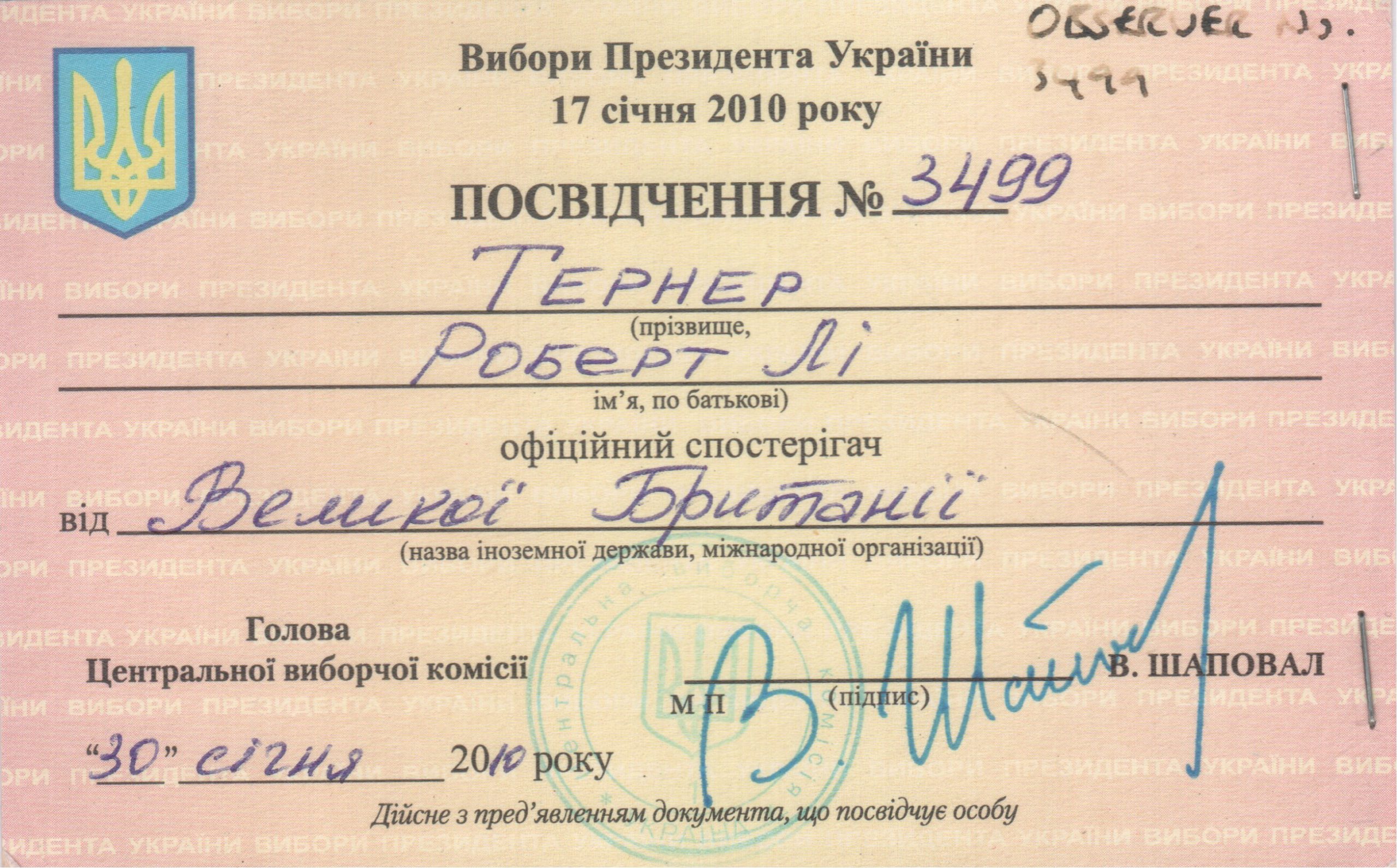
My observer’s card from the 2010 Presidential Election
The job contained much to enjoy. Ukraine, then as now, was an important country. It had become independent from the Soviet Union in 1991. People were fond of quoting former US National Security Adviser Zbigniew Brzezinski, who said “Without Ukraine, Russia ceases to be an empire.”
In August 2008, two months after my arrival in Kyiv, the Russo-Georgian War broke out, sending shockwaves around the region. British Foreign Secretary David Miliband visited Kyiv the same month, meeting President Yushchenko and Prime Minister Tymoshenko. In September I attended the opening of the Ukrainian parliament; my diary notes that: “by the end of the day the governing coalition had collapsed, setting in train a constitutional crisis”. The Duke of York, Prince Andrew, visited in October.
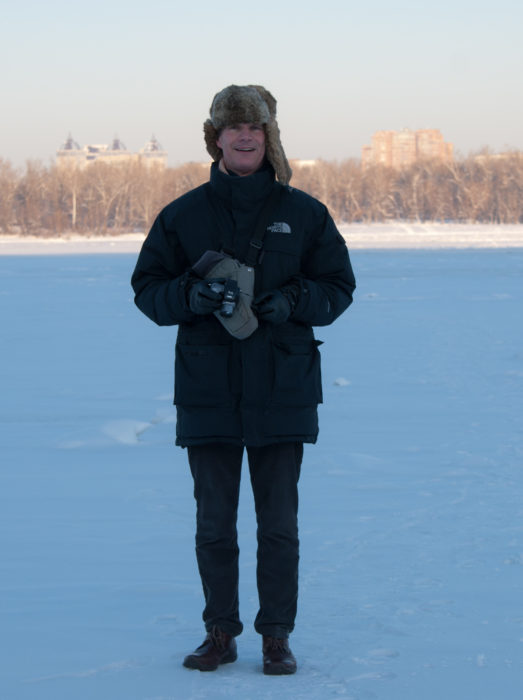
On the frozen River Dnipr in winter
Ukraine’s democratic, security and economic challenges made being ambassador fascinating and intense. As well as government contacts I met opposition leaders such as Viktor Yanukovych (later President) and Mykola Azarov (later PM), parliamentarians, Ukrainian and British business leaders and civil servants. Ambassadors included my Russian colleague, Viktor Chernomyrdin, prime Minister during my time in Moscow and author of the epigram “we wanted the best, but it turned out the same as always” (xотели как лучше, а получилось как всегда). Crises included the cutting off of Russian gas supplies to Ukraine in January 2009 and numerous concerns about democratic norms and freedom of expression. I travelled from Lviv in the west to Dnipropetrovsk and Donetsk in the east, and Crimea and Odessa in the south. The latter trip included the Strategic Missile Forces Museum – worth a visit.
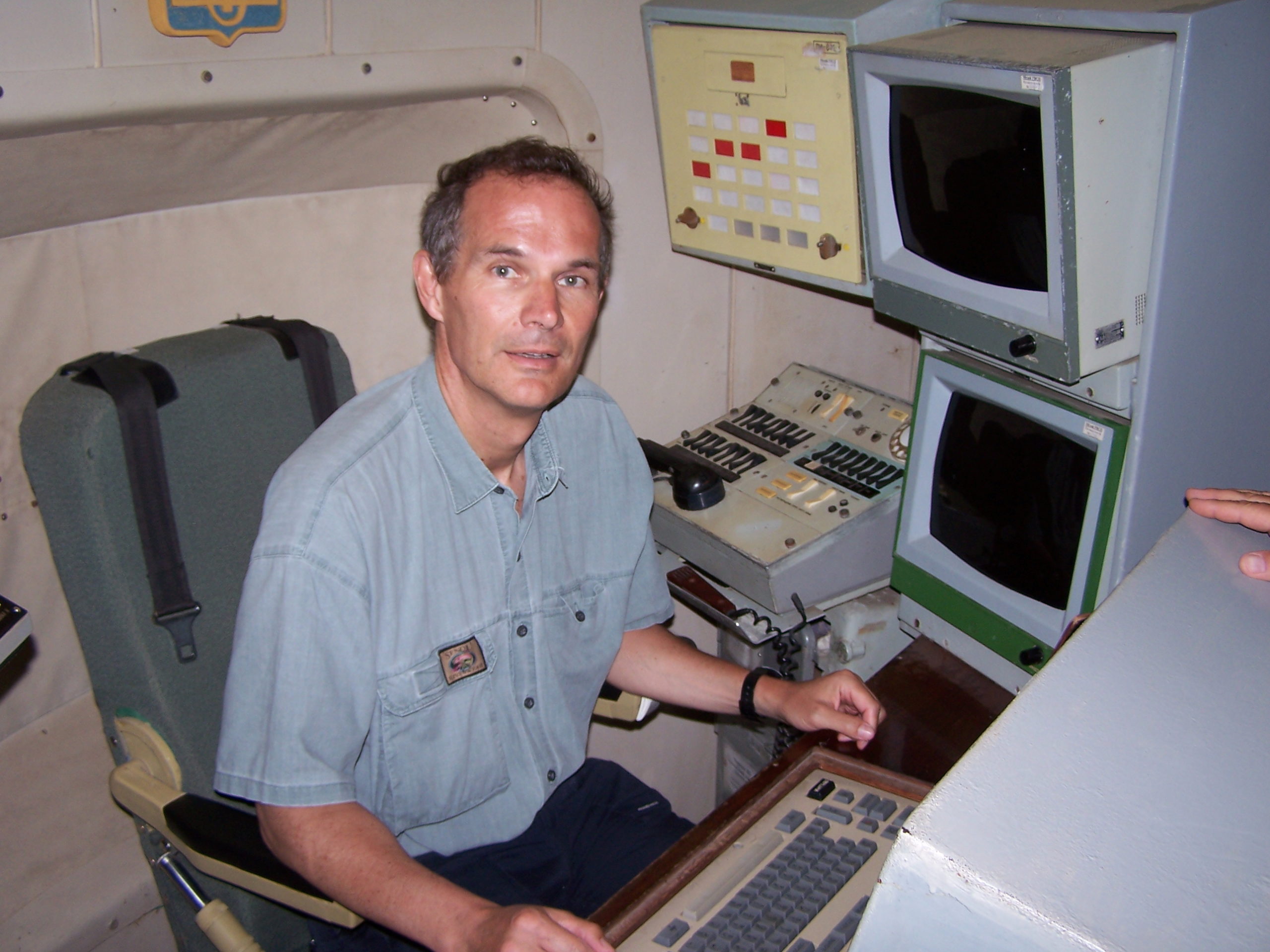
In the command bunker at the Strategic Missile Forces Museum
I developed a great affection for Ukraine and its people. I learned Ukrainian – about as different from Russian as Dutch from German. It was the sole language of discourse in many areas, including much of politics. In May 2009 I did language immersion in Lviv, learning phrases for “I completely agree”, “You’re totally wrong” and “climate change” in a former monk’s cell at a school for the performing arts where violin music seeped under the door. At one lunch our meal of “soup with ears” – a Galician dish – reminded me that in the board game “Diplomacy”, set in 1901, control of Galicia was a key to winning the game.
The same year I began blogging. The idea arose from some career coaching. “For what are you known in the Foreign Office?” my coach asked. I thought of the wise ex-ambassador, and came up with some standard guff. “Yes, but what do you like doing most?” she insisted. “You need to combine that with diplomacy, so it becomes part of your brand.”
It turned out that what I liked doing most was writing.
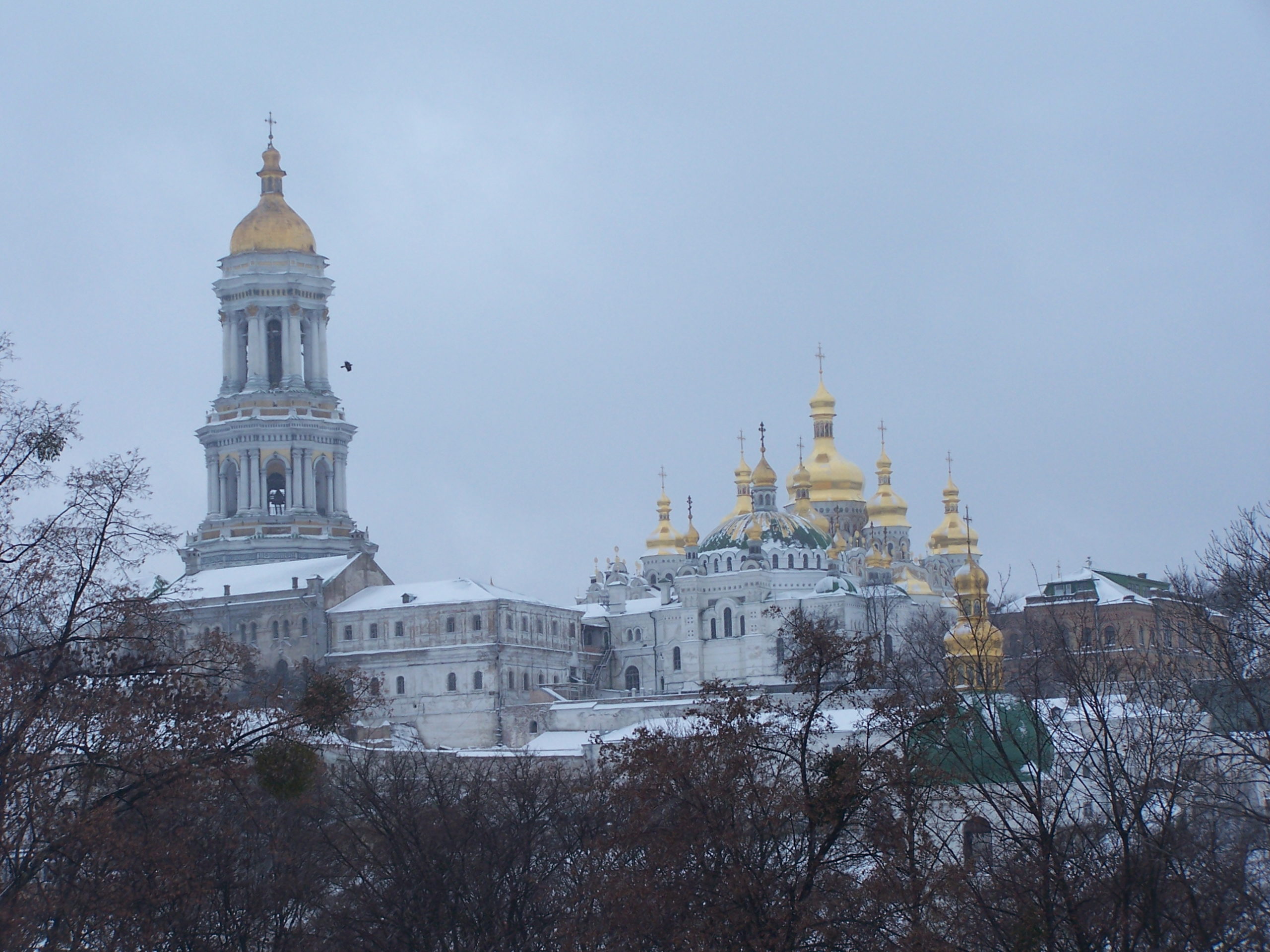
Kyiv is a spectacularly beautiful city
In 2009 diplomatic blogging was not widespread. My efforts, published in English and Ukrainian on the nascent FCO (now FCDO) blogging site, had modest impact. Then a Ukrainian-language newspaper in London, Ukrayinska Dumka, asked if they could reprint it. Delo, a Russian-language business weekly in Kyiv, followed (their headline in the title image reads “Why a diplomat blogs”), followed by the English-language Kyiv Post. Then Ukrayinska Pravda, Ukraine’s biggest blogging site, began publishing my posts, often generating much debate.
In the course of three years my blogging on everything from freedom of speech to Down’s syndrome, British films and music, Chernobyl, women ambassadors, visa policy and reform of the Ukrainian gas industry became central to my work. When I met Ukrainian politicians, they opened by commenting from their morning press summary on something I had written. London welcomed this. Leigh is widely seen as one of the FCO’s leading users of new media, my appraisal of October 2011 commented…his blog is a valued tool in getting across the UK’s messages in Ukraine.
Between 2009 and 2021 I blogged in Kyiv, Istanbul and Vienna. 498 posts are up on the FCDO site. I opened a Twitter account in 2011 and Instagram in 2015 – followers welcome. Social media ensures UK messages reach a wider audience than was possible in the past and can stimulate feedback and discussion. By the time I left Kyiv after the Euro 2012 football finals in Ukraine, I had perhaps built something of a brand, of which writing and social media were key parts. But feel free to tell me you disagree!
P.S. Researching this piece I came across my diary for 24 June 2012, in Kyiv. “Just back from watching England crash out on penalties to Italy in the quarter-final of Euro 2012.” Some things never change.
*
The previous posts in this series are:
– Diplomatic lessons 1, 1979-83: Don’t judge a book by its cover
– Diplomatic lessons 2, 1983-87: Languages change everything
– Diplomatic lessons 3, 1987-91: go for the hard jobs
– Diplomatic lessons 4, 1991-95: have a plan, and break it
– Diplomatic lessons 5, 1995-98: make a difference
– Diplomatic lessons 6, 1998-2002: pendulums